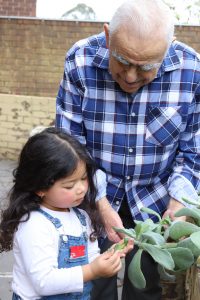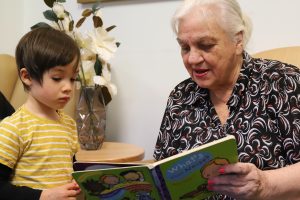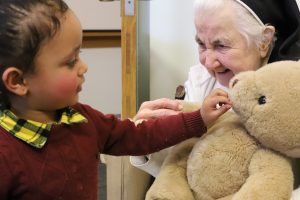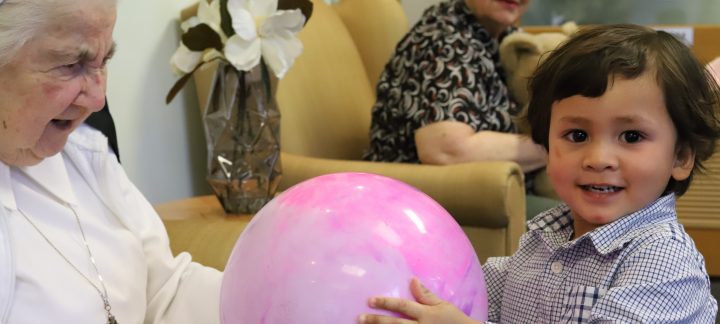Twice a week, a line of eager young children, walking two-by-two, snakes its way from Early Learning Centre Abbotsford to neighbouring Mercy Place Abbotsford for the children’s regular catch up with the home’s elderly residents.
Since 2016, the residential aged care home has hosted kindergarten children as part of its intergenerational program. Residents and children participate in activities together at the home — they sing and dance, paint and read, role play and chat, but most importantly, they simply engage with each other.

Avid gardener Bobby Kandiliotis enjoys sharing his love of plants with Samsara Shrestha.
Age is not a barrier for residents or children, says Mercy Place Abbotsford Service Manager Rose Tunious.
“When we originally started up our intergenerational program, the residents and children enjoyed it so much that we went from one visit a week from the children to two,” she says. “The children come over to our home and the delight from both our residents and the children is obvious. Because they are such regular visitors, the children and residents all know each other’s names, and the kids know who they can go to if they want to read a book or paint a picture because they have developed relationships. Seeing their relationships grow and the easiness of the interactions is just lovely.”
I love seeing the little ones’ happy faces and listening to their funny conversations.
Intergenerational programs are designed to help elderly aged care residents not only to reengage with the world again but also to reignite their sense of fun and play and, ultimately, their self-worth.

Denise Mayger reads a story book to Zen Caldwell
Without a doubt, the children’s visits help lift residents’ moods, make the residents feel better about themselves and increase their mobility, Rose explains.
“Our residents really look forward to the visits,” she says. “They are often reminded of their own childhoods when the children are here and they seem to be more relaxed and open during the visits. The residents are also moving around a lot more as they engage in the activities, which is another clear benefit. Sometimes, some of our more mobile residents go out and visit the kindergarten too.”
Seventy-two-year-old resident Rosemary Wright eagerly awaits the children’s twice-weekly visits.
“It’s one of my favourite times of the week,” she says. “I love seeing the little ones’ happy faces and listening to their funny conversations. And I like doing the activities with them; it makes me feel happy too. I quite enjoyed painting when I was a youngster so I also like painting with the children and showing them how I do things. I think having children around the place makes everyone feel happier.”

Sister Velda Singleton enjoys spending time with Dev Neupane and his teddy.



